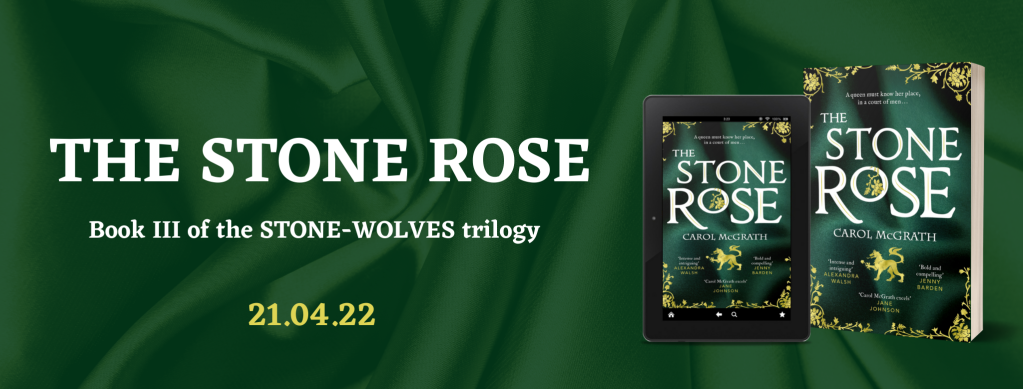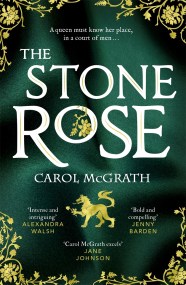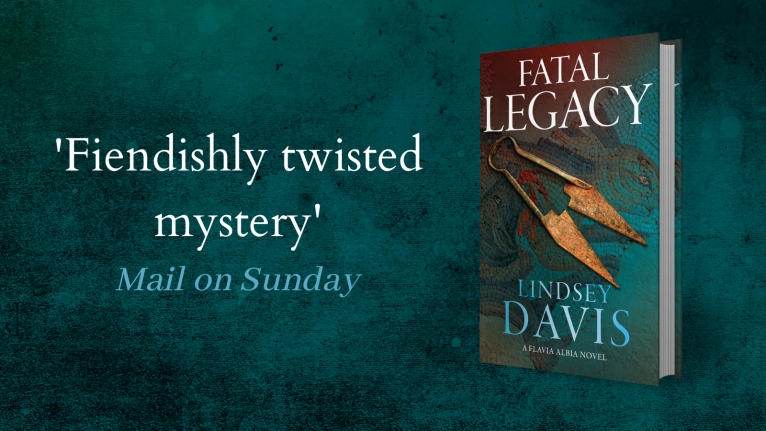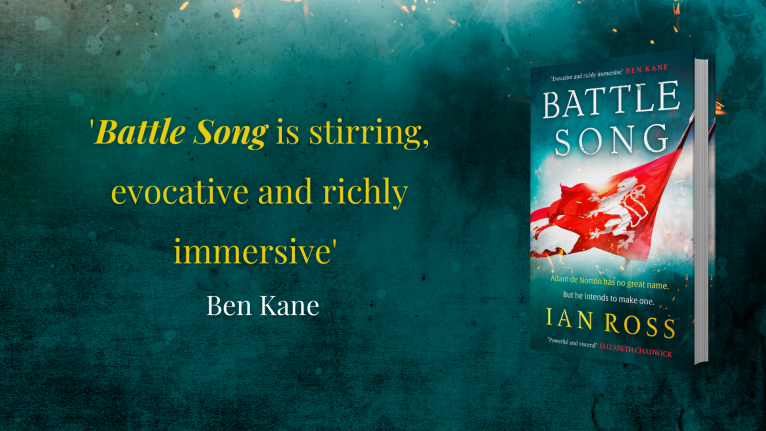Extract of The Stone Rose by Carol McGrath

Prologue
Agnes
All Souls’ Night, 1352
Sleep does not come easily on the night of the dead. I toss and turn until I hear the clip-clop of horses’ hooves entering the yard. It’s late – too late for visitors to my stonemasons’ workshop, being almost the midnight hour. Yet I am so curious that I throw off my bed covers. It’s chill as I reach down and drag on my boots. I hurry to the window overlooking the yard.
Peering through the shutters, I can see a translucent mist hovering outside, lit into an eerie miasma by the bluish full moon. For a moment, I listen to the neighing and snorting down below. A heart- beat passes before I discern torches, shadowy figures moving about and the shapes of whinnying horses. All of a sudden, the moon dips behind a cloud. My breath catches in my throat. All Souls’ Eve is a haunting time. A loud knocking on the workshop door below my bedchamber makes me jump nearly from my skin.
I cannot resist its call and nervously hurry from the window, dragging my cloak from a nail on the wall and throwing it over my shift. I snatch up my lamp and slowly descend two narrow staircases through the house. At ground level, the air in the workshop is even chillier than above. I should wake up my people. I should call for my steward, but I don’t. I pull my cloak tight and, as if possessed, move forward, quiet as a cellar mouse.
Slipping between the workbenches and tables, I make haste to reach the workshop entrance, slide back the panel covering the peephole and glance out. Lanterns gleam just beyond the door, shadows dancing in their yellow light. Church bells sound loudly, heralding in the day of the dead. My heart beats faster. There’ve been too many deaths in these pestilence years. I don’t wish to permit restless souls inside my house. They might spin around our statues, tumble the stone gargoyles commissioned for St Lawrence’s Church, destroy our precious decorations – my carved roses, prayer scrolls and silver-tinted knights’ spurs. Such ghosts could wreak havoc on the drawings laid out on the long trestles; they could take our chisels and hammers. Even steal our souls. With a shudder I leap back from the peephole lest lost spectres enter me through my eyes. The knocking starts up again, close and more insistent this time – so close, I place my hands over my ears to shut it out. Our watchman has allowed ghouls through our gates, or they have slyly slid by him. I spin around, fast as I can, lift my lamp higher and shout for the steward who sleeps in the closet at the top of the staircase.
Dame Edith, my housekeeper, appears at the bottom of the first stairway, shrouded in her mantle.
‘Don’t answer, madam,’ she hisses through the echoing workroom. ‘Do not open up. They might be robbers – even masons, intent on robbing us – or they could be spreaders of the pestilence.’
My six house servants, two journeymen and four young apprentices crowd down the stairway into the workshop. My steward, Master Albert, is behind them, his nightcap ridiculously perched askew on his head. His cloak is tightly wrapped around his fat belly. The Angelus bells stop ringing. Master Albert hurries to me, bumbling his way through the blank-eyed statues and brooding gargoyles.
‘Mistress Agnes?’ he says, and I am suddenly more conscious than ever that, as I stand there – a mere chit of a girl, a female stonemason – I am in charge of these people and this household.
When I am in the stone yard, with my chisel and sturdy hide apron, I have no difficulty in shouting at the masons in a voice that is as dust-roughened as any of the men’s. The shiftless life of a mason is a cut-throat business, and there is no use in sentiment. But when I am within these four walls, a nightgown my only flimsy protection against the cold and with no leather hat in which to hide my long black hair, I feel like nothing more than a small, skinny, fatherless eighteen-year-old, shivering on the night the ghosts walk and strange knockings come to the door.
A shout penetrates the walls. ‘Christ’s cods! Open up, in the name of Dowager Queen Isabella –’ a silent pause – ‘else we break down the bloody door.’
My servants race down the rest of the stairs. They hurry past the long trestles, brandishing saucepans and chopping knives.
I turn to Master Albert. ‘You do it. Best you open up. That’s no ghoul’s voice calling. Nor is it the pestilence.’ I have collected my own wits and I cast a warning glance at Dame Edith. I announce in a low voice, ‘Let us see what the Queen’s messenger has to say, Albert.’
Master Albert nods and warily drags back a bolt. He pulls open the door a crack.
A boot enters the opening between post and door.
The steward opens it further, and there they are: six fierce- looking men in helmets; soldiers armed with swords. They are surrounding a hooded man of middling age, dressed in royal livery. This hooded man says nothing, but thrusts out a folded letter to Master Albert.
I push past my steward and peer down at the letter’s seal. It is split into quarters. I recognise the three lions of England, the lilies of France and, below, a cross saltire. I study the fourth quarter more closely. It shows a diagonal strip. Purple and gold tassels droop from it. The seal is indeed royal. Baffled, I stare at it for a moment and look up at an earnest face.
‘At last,’ the hooded man says, his voice accusatory. ‘Did you think, mistress, we were demons of the night, come to fetch your souls?’
I had thought precisely that, but I keep my mouth shut tight, wondering what this is all about.
He stands to attention and an explanation follows. ‘I am the Dowager Queen’s messenger. We have ridden all the way to the City from Castle Rising, the Queen’s castle in Norfolk. Long ride. Four days at a gallop. I must speak with you. And we need shelter. May we enter?’ He pauses. ‘A bite to eat and something to drink? Here . . .’ He thrusts the letter forward. Its colourful dangling tassels are taunting me. ‘You are fair Agnes de Ramsey, are you not?’ he says. ‘Stonemason daughter of William de Ramsey, late Master Mason to the King?’
I am disarmed by his flattering introduction. Am I ‘fair Agnes’ indeed? My hair is long and dark. I can sit on it, though I generally wear it plaited under a coif. My eyes, I am told, are fine. They are the shade of sea glass – green and almond-shaped. I am slim. Who has called me ‘fair Agnes’? I have never seen myself as ‘fair’ – too small, too dark, too much time spent with a father who treated me like a son. I glare at the messenger and take possession of the letter. I can see now that it’s Dowager Queen Isabella’s seal. She, whom some call a ‘she-wolf’, and others ‘our kingdom’s saviour’. It really is from her. I feel my eyes open wider. My father had worked for the King, her son, at the Tower. Perhaps she has a commission for us. Maybe she does not know that my father, the Master Mason, has died of the pestilence, but yet she must, or somebody does, since the letter is for me, not him.
I manage a smile and say, ‘Enter and welcome, sirs. My steward will escort you to the hall, where the fire is lit. There’s the pottage left out for breakfast, and pallets and blankets to spare in the alcove chests. But, I pray you, leave your weapons by the door.’
The half-dozen exhausted helmeted men waste no time filing in, and do as I bid, leaving their swords and scabbards in a heap.
‘See they are all accommodated,’ I say to Master Albert. ‘We can trust them – the Queen’s men.’ I ponder that for a moment, and turn the letter over in my hands. I won’t read it until I am back in my chamber. Chasing my goggle-eyed servants back to the kitchens, I order the cook to go to the hall’s fireplace and warm up the break- fast pottage for our guests. ‘Goodnight,’ I call, as the strangers follow Master Albert.
I am left with Dame Edith and the tall, hooded man; it seems the Queen’s messenger is not to be dismissed so easily. I turn to him and ask, ‘But who are you, and what does the Lady Isabella want with me ?’
‘Master Gregory is my name,’ he says and clears his throat, tugging his hood down to reveal a gentler face than I had expected. His grey eyes are not those of a fierce soldier and I feel more at ease, though somewhat embarrassed on account of my uncovered head and the loose abandon of my dark curls. My hand instinctively touches my hair. He adds, ‘Captain of the Dowager Isabella’s Guard. Mistress Agnes, you are to travel with me to Castle Rising. It’s all in the letter.’
I nod, looking down at the Queen’s seal. I am impatient to break it open and read the contents. A letter to me, humble Agnes de Ramsey, and from a queen.
‘Go and eat, Master Gregory,’ I find myself saying, as though he were one of the apprentice masons in the yard. ‘Please get some rest. I would be honoured to talk in the morning.’
Back in my chamber, most curious, I break the wax seal. I unfold the letter and lay it flat on the table. Moving my candle closer, but not too close lest I damage it, I begin to read aloud:
From Isabella, Queen Dowager, written on the fifteenth day of October of the twenty-fifth year of the reign of the third King Edward.
Greetings, Agnes, daughter of the stonemason William de Ramsey. I request your attendance upon myself at Castle Rising, in the county of Norfolk, that we may discuss the building of my sepulchre, to be placed within the Church of the Grey Friars in the City of London, where I am to be laid to rest. I have details to speak of, which I do not wish to commit to parchment. All comfort will be arranged for your journey from London and your return, including accommodation. Since we dwell in troubling times, I send you a stout guard.
Isabella, Dowager Queen of England.
‘These are troubling times,’ I mutter to the walls of my chamber. Carefully, I fold the letter again. How dangerous would such travel be, through villages haunted by death? I have never gone more than these few miles within London, except when I was a child and lived by the great cathedral at Norwich: my father’s life’s work. I have never enjoyed much company – except for the apprentices, the house servants, occasional guild celebrations on saints’ days and my father – and the prospect of a journey is daunting. I swallow hard. Roads will be frequented by pestilence survivors and the dispossessed, who are only too ready to steal and kill. At once, I imagine desperate, fearful people. Many people say the great Death is over and normal life has resumed – already, London is busy again, as if it never happened – but enormous cemetery pits outside the City walls constantly remind us of the Death that has stalked the streets these past years, destroying all our lives.
The pestilence took my father only a year since. Alive one week, dead the next. I sigh heavily. I, a girl of eighteen years, am now the mistress of Papa’s workshop and have inherited his responsibilities. It’s as well Papa has trained me to design tombs . . . But, to design one for the Dowager Queen – well, that’s a huge undertaking. It’s overwhelming.
Yet this is a commission I must not refuse. We need the Dowager’s silver if my business is to survive. Papa spoke highly of the old Queen, of her courage and her adventurous life. He told me of her beauty, how she is tall and golden haired, and always wears gorgeous garments. She loves her children, he said, especially Edward, our King. But she has suffered much sadness. Years gone by, her gentle younger son, John, died on campaign. She has two daughters: one is Queen of Scotland and the other Countess of Guelders. They survive to this day.
However, Papa also told me many odd tales about Queen Isabella. She was only twelve when she married the old King Edward, who she strongly supported against nobles who hated his favourites. But when Sir Hugh Despenser entered her husband’s close circle, he manipulated the King for his own evil intent. Papa said Queen Isabella’s revenge on Sir Hugh was as ruthless as it was necessary, and that many people who listen to gossip believe the Queen – along with her supposed lover, Roger Mortimer – was also responsible for her husband’s death in a dark cell in Berkeley Castle. But my father thought this last story was untrue. ‘There is no proof,’ Papa would say, with a creased and puzzled brow. ‘He may even have escaped and fled to Italy.’
So I cannot help but be curious about this Queen of whom some whisper murder and others, Papa included, declare their admiration for her courage, intelligence and her elegance.
I hug myself, now excited by the commission, the wandering souls outside forgotten. It will be an honour to design Queen Isabella’s sepulchre. Papa would want me to accept.
I remove my boots, blow out my candle and drop into my bed, still wrapped in my cloak. I will speak with the Queen’s tall, tow- bearded messenger in the morning.
'A real tour de force of gripping writing, rich historical detail and complex, fascinating characters. Superb!' NICOLA CORNICK on The Stone Rose
_________________
EARLY READERS ARE GRIPPED BY THE STONE ROSE!
* 'Springs to vivid life for the reader . . . A compulsive read' ANNE O'BRIEN
* 'An enticing and intriguing tale of a woman who is driven to desperate and ruthless lengths to protect those she loves' ALEXANDRA WALSH
* 'Carol McGrath really got into Isabella's head . . . Enlightening' SHARON BENNETT CONNOLLY
* 'Bold and compelling' JENNY BARDEN
* 'A novel that's a definite page-turner' LIZ HARRIS
_________________
London, 1350. Agnes, daughter of a stonemason, is struggling to keep her father's trade in a city decimated by plague. And then she receives a mysterious message from the disgraced Queen Isabella: mother of King Edward III, and widow of Edward II. Isabella has a task that only Agnes can fulfil. She wants her truth to be told.
Much has been whispered of the conflicts in Isabella and Edward's marriage. Her greed and warmongering. His unspoken love for male favourites. But as Agnes listens to Isabella, she learns that she can be of help to the queen - but can either woman choose independence, follow her own desires, and survive?
The sweeping third instalment of Carol McGrath's acclaimed Rose Trilogy: the gripping series exploring the tumultous lives and loves of three queens of England - and of three women who lived in their shadow.
Based on the extraordinary true story of the female stonemason who carved a queen's tomb!
For news, updates and exclusive material, sign up to Carol’s newsletter here: http://carolcmcgrath.co.uk/newsletter-sign-up/
Twitter: @CarolMcGrath







